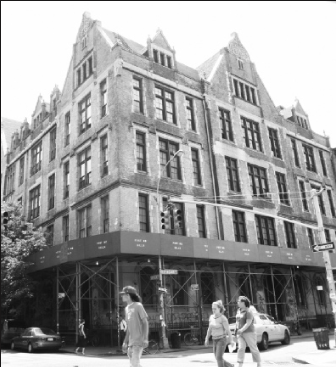By Lucas Mann
While the Clemente Soto Velez Cultural Center may be a house divided, with its two rival artists groups locked in a seemingly endless feud, the future of the actual building is suddenly looking brighter.
Included in New York City’s capital budget on June 20 was $9.54 million to fund the renovation of the former elementary school at 107 Suffolk St. that is home to the Lower East Side arts center.
“This money will prevent the building from literally falling apart,” said City Councilmember Alan Gerson, who led the push for the funding and has been heavily involved in supporting C.S.V. for years. “One way or another, it needed to be fixed up. The money will allow the great art created in the building to continue. It’s a major accomplishment and I cannot be happier.”
The refurbishing of the facade and the roof of one of Downtown’s last city-owned art centers, however, apparently won’t stop the destructive infighting going on inside the center’s walls. For more than a decade, the Clemente Soto Velez Cultural and Educational Center, a group of artists who have been the building’s leaseholders since 1993, and Artists Alliance Inc., a group of visual artists who occupy the building’s top two floors, have been haggling over the building’s management. A June 12 ruling in New York State Supreme Court seems to have only ensured continuing disagreement.
A.A.I. had filed suit, claiming that the center’s new bylaws, adopted in December 2006, were invalid. However, the June 12 ruling dismissed their claim.
Luis Cancel, C.S.V.’s executive director, said his rivals’ lawsuit is merely an attempt to block an arbitration panel’s having awarded C.S.V. $389,500 in arrears from A.A.I. artists.
“Their only defense was to try and invalidate our bylaws,” Cancel said. “The courts have been ruling consistently that we, as the leaseholders, are allowed to collect occupancy fees. We will use all legal means possible to make sure that people pay.”
Not surprisingly, Shelly McGuinness, A.A.I.’s executive director, had a different take on the ruling.
“We couldn’t be happier,” McGuinnes exclaimed. “We are allowed to move forward with the more important part of our complaint.”
Indeed, the ruling by Judge Jane S. Solomon was not a simple one. In addition to challenging the center’s new bylaws, A.A.I.’s suit also argued that C.S.V. should be held accountable for fulfilling a plan, outlined in November 2001, that stated: “[a] new not-for-profit corporation will be formed to operate the [building] in accordance with its mission to serve the community and provide below-market space for theaters, visual artists, and not-for-profit cultural organizations.” This management group was to be called N.F.P. According to A.A.I., in 2002, the groups twice attempted to form N.F.P. and had their applications rejected by the New York Department of State, leaving C.S.V., as the only leaseholder, the property’s confirmed managers.
“What is most relevant right now is the court’s decision that allows our complaint regarding overall management and operation of the building to go forward,” McGuinness maintained. “A.A.I. spent a tremendous amount of time negotiating in good faith and we look forward to a favorable decision that respects the negotiation process and agreements made between A.A.I. and C.S.V.C.E.C.I. For too long, A.A.I. has negotiated in good faith only to have the ever-changing leadership of C.S.V.C.E.C.I. renege on its obligations and agreements.”
What McGuinnes referred to as “the heart of our lawsuit” Cancel called a mere technicality.
“We’re not really concerned about it,” Cancel said of the second half of the lawsuit. “The judge didn’t say it was a binding contract, he just said to A.A.I., ‘Go forward and try to prove it.’ Since 1993, the question of leaseholder has never been in doubt. We are in control of this building.”
Indeed, the only thing the two groups agree on is the benefit of receiving the $9.54 million for repairs and the overwhelming need for it.
While Cancel referred to getting the funding as a “triumphant gain” for C.S.V., McGuinness insisted that A.A.I. had just as much reason to celebrate.
“We are very pleased that the City Council gave money to the building; it’s in terrible need of repair,” she said. “That money is not going to C.S.V. — it’s going to the facade of the building and benefits the building as a whole.”
Cancel, however, does not think any of that money should be seen as directly benefiting A.A.I.
“There is no such thing as A.A.I. space,” he stressed. “It’s the C.S.V Center that the money is going to.”
While C.S.V. awaits payment of the almost $400,000 the arbitration panel awarded them, there remains a list of 30 A.A.I artists who each owe tens of thousands of dollars in rent individually. However, A.A.I. does not recognize the arbitration as valid and will not pay until a court orders them to.
“C.S.V.C.E.C.I. commenced an arbitration against A.A.I. and its members,” McGuinness said. “A.A.I. and its members did not agree to arbitrate in the arbitration, and did not participate in the arbitration. C.S.V.C.E.C.I. went forward anyway and a decision was issued, absent any challenges to the position of C.S.V.C.E.C.I.”
The American Arbitration Association conducted the arbitration, and its findings were supported by the government officials now funding the renovations.
“We put in place an arbitration process which followed the standard procedure,” Gerson maintained. “Each group had an arbitrator and they co-selected a third. Anyone who wishes to stay in the building should abide by the arbitration outcome.”
C.S.V., bolstered by the court’s dismissal of A.A.I’s attack on the new bylaws — albeit a ruling that McGuinness pointed out was based on the judge’s opinion that nonprofit organizations don’t fall under the Supreme Court’s jurisdiction — is mulling a new solution to the ongoing conflict: eviction.
“It’s all a legal matter,” said Sheldon Fox of Foxy Management, the company that C.S.V. hired to manage the property. “We’re waiting for it all to get hashed out in court and for our attorneys to give the word that we can go ahead with evictions. We are currently pushing forward with rent collections.”
Considering A.A.I.’s stance that they owe nothing and that they originally stopped their rent payments in response to C.S.V.’s poor management of the building, eviction proceedings may well be the only foreseeable outcome. A.A.I. says they have received no eviction notices and aren’t worried about it, but Cancel sounded determined.
“The cost of this space is $12.40 per square foot; that’s two-thirds cheaper than the prevailing rate,” he noted. “This city has thousands of visual artists who need space and we are currently looking at applications of people who will use our space and are willing to pay for it.”
On July 30, Judge Solomon will hear discussions on A.A.I’s attempt to hold C.S.V. to its contract of 2001 to form N.F.P., a new management group for the building.






































